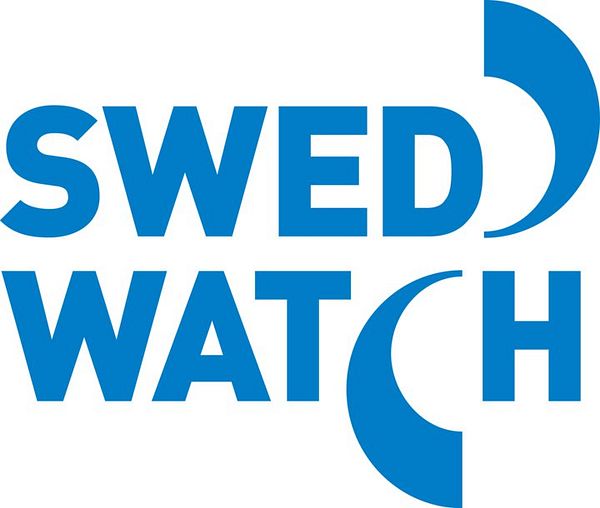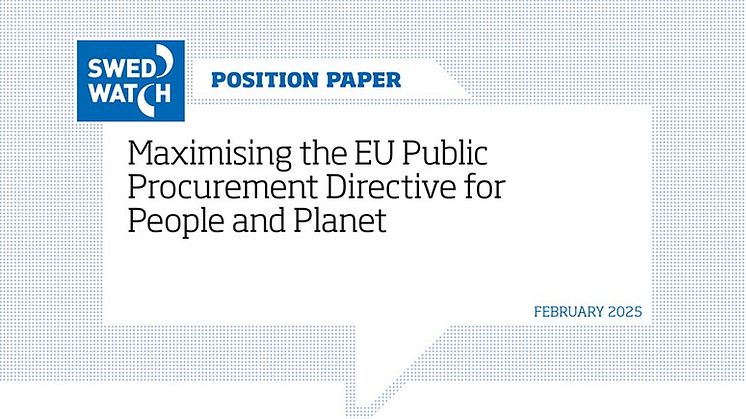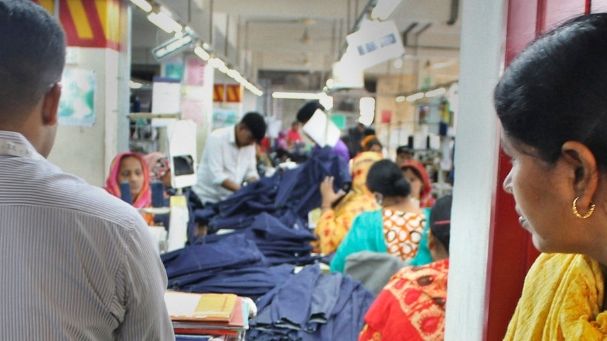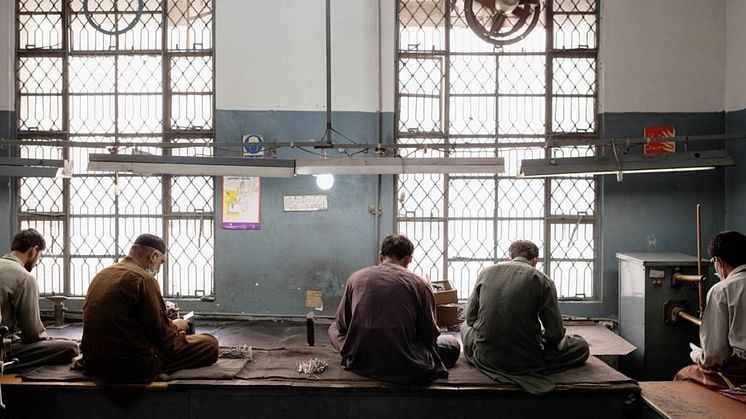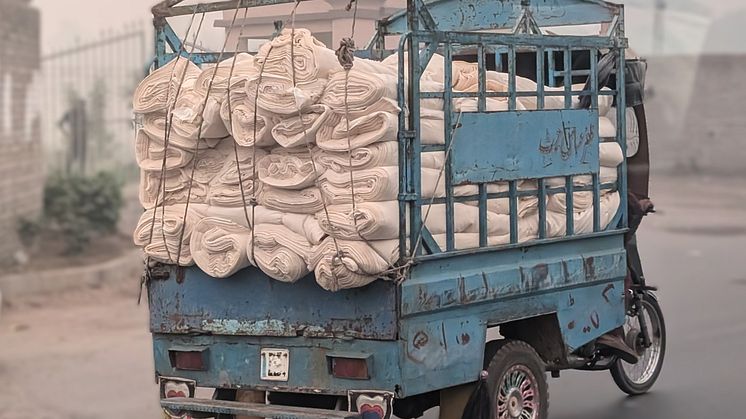
Press release -
New Swedwatch study on Pakistan´s textile sector reveals serious shortcomings in EU procurement rules
A new report by Swedish NGO Swedwatch reveals that public funds used to procure hospital textiles are linked to exploitative labour practices in Pakistan’s textile industry. The findings expose major gaps in the EU’s public procurement rules and urge the European Commission to propose binding due diligence standards to prevent public spending from enabling human rights abuse.
Pakistan is a major supplier of hospital linens and other textiles to the European market, including the Swedish healthcare sector. Yet Swedwatch’s new report, Public Money, Private Harm, based on interviews with 89 workers from 9 factories in Faisalabad and Karachi, finds that EU member states such as Sweden continue to source from Pakistani factories marred by labour rights abuses.
Swedwatch’s report is based on-site research conducted in collaboration with Pakistani NGO AwazCDS-Pakistan.
Workers at these factories report widespread exploitation. They earn far below the official minimum wage – which itself is less than half the estimated living wage – and the majority work without formal contracts and receive little or no formal social protection if injured or sick, all while enduring excessive working hours and poor occupational safety. Workers also report about union busting and discrimination and harassment against women.
The exploitation of workers in supply chains—particularly in textile factories—is alarmingly high, says Zia ur Rehman, Founder and Chief Executive of AwazCDS-Pakistan.
“It is deeply concerning that the enforcement of local labor laws remains weak due to a crisis of governance and legitimacy in the country.”
He emphasized the urgent need for a combination of legal transparency in supplier contracts and purchasing agreements, targeted awareness campaigns for suppliers and workers, and participatory enforcement mechanisms to ensure full compliance with human rights due diligencestandards - that should be mandatory - and to protect the rights of workers across the supply chain.
Factories linked to bedlinen at Swedish hospitals
The factories included in the research produce items for European suppliers (among other clients) who have contracts with Swedish Regions responsible for procuring hospital and healthcare textiles.
Although the Regions have made commendable efforts by introducing sustainability codes of conduct and contract clauses, the findings show that, without binding sustainability requirements across EU countries, procurement practices still fall short of effectively preventing, mitigating, or addressing human rights violations.
“Enabled by flaws in the EU’s public procurement directive, European taxpayer money is effectively supporting a system that rewards exploitation — undermining both human rights and fair market competition. Public procurement should be a force for good, not a subsidy for abuse,” says Sofia Käll, Programme Officer at Swedwatch and leading researcher of the report.
A case study with European relevance
Public procurement in EU member states is governed by the EU’s Public Procurement Directive, adopted in 2014. While the directive allows for the inclusion of social and environmental criteria, its implementation remains voluntary and suffers from weak enforcement. As a result, companies contributing or linked to labour rights abuse can still win public contracts, with low-price bids often outcompeting more responsible suppliers.
“This makes the European public sector complicit in the perpetuation of exploitative working conditions”, says Sofia Käll.
Textiles sourced from Pakistan represent a small share of the EU’s €2 trillion in annual public procurement, but similar risks of labour rights abuses exist in many other sectors — including electronics, food and agriculture, and construction.
“The testimonials from Karachi and Faisalabad are just the tip of the iceberg when it comes to worker exploitation in global supply chains linked to European procurement. But this also presents an untapped opportunity for change. When procurement is designed and implemented responsibly, it can improve conditions for millions of workers across industries,” says Sofia Käll.
The way forward – Swedwatch’s recommendations
Swedwatch’s research raises critical questions about the EU’s public procurement laws. With the European Commission currently reviewing the Public Procurement Directive, this is a crucial moment to address these concerns.
To ensure robust mechanisms for addressing harm in global supply chains, EU policymakers should introduce mandatory human rights due diligence requirements into procurement law. These due diligence processes should align with internationally recognised frameworks, with meaningful worker engagement as a central component to avoid a false sense of compliance.
Secondly, EU member states and their procurers should be given the necessary support and capacity to enforce sustainability requirements in public procurement. A stronger, better-equipped procurement workforce would not only lead to more socially responsible outcomes but also to greater efficiency and public trust.
BACKGROUND:
Swedwatch’s report is based on qualitative on-site research conducted in two phases in Pakistan—first in Faisalabad (January- July 2023), then in both Faisalabad and Karachi (November 2024). In collaboration with Pakistani NGO AwazCDS-Pakistan data was collected through 12 in-depth interviews with factory workers and eight focus group discussions involving 89 participants, with a roughly equal gender balance.
In the European Union (EU), public procurement accounts for approximately 15% of GDP – nearly €2 trillion annually - giving public authorities significant influence over environmental sustainability and human rights in global supply chains. By integrating social and environmental requirements into procurement policies and procedures, public authorities can help foster responsible business practices, especially in high-risk sectors such as textiles.
Swedwatch is an independent, non-profit research organisation with over a decade of experience investigating and leveraging public procurement to address human rights and environmental issues. Since 2025, it has been an official member of the European Commission's Stakeholder Expert Group on Public Procurement.
FACT BOX
The textile sector is the largest manufacturing industry in Pakistan, and the textile industry accounts for around 60% of Pakistan's total exports in 2021. While no centralized public data currently exists on the total volume or value of healthcare textiles procured by the Swedish Regions, or the proportion specifically sourced from Pakistan, a mapping exercise conducted by the Regions’ sustainable public procurement network suggests that between 30 and 50 percent of the production for a subset of suppliers takes place in Pakistan. In dialogue with Swedwatch, several EU-based companies directly supplying healthcare textiles to Sweden’s public sector confirmed that Pakistan serves as a key production hub in their supply chains.
Topics
Safeguarding human rights and environment in business
Swedwatch is an independent, non-profit research organization dedicated to promoting responsible business practices and empowering rights holders. We achieve this by exposing the human and environmental impacts of unsustainable business operations and fostering collaboration between stakeholders to drive meaningful change.
